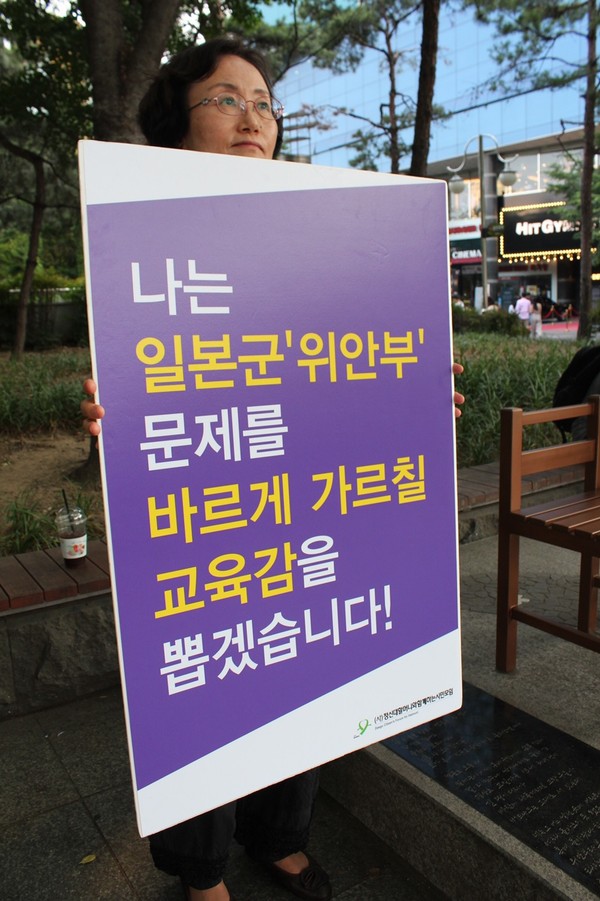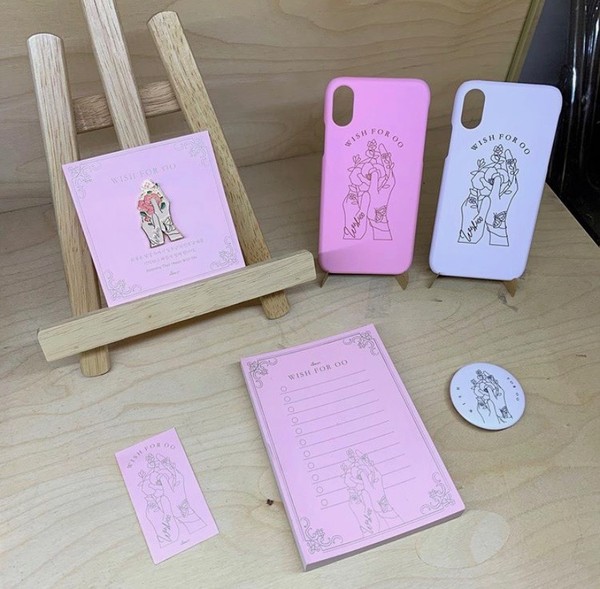
Everyone lives with pain. Sometimes the pain can be healed with just a single word, but other times the pain cannot be healed even with a hundred words. It is impossible to compare the extent or magnitude of pain each person feels, but we can feel each other’s pain by sharing and empathizing. Korea also has pain, some of which has not been healed yet at all. One of a lot of pain is Japanese Military Sexual Slaves, so-called “Comfort Women”. Despite the countless fighting on their behalf, many have failed to ease these women’s pain completely. SMT met with Anyi JeungSeun, a person sympathizing with the pain Japanese Military Sexual Slaves feel, who is laying the foundation for future generations so that they too will understand the pain felt by Japanese Military Sexual Slaves.
Before getting started, would you please introduce yourself to SMT readers?
Until completing high school, I lived in Busan. I left Busan for Seoul, where I graduated from the Department of French Language Education at Seoul National University. I spent 6 years working as a French teacher in Busan and Seoul. My family then moved to Japan, where we lived for 4 years before returning to Korea. I’ve been in Daegu now for over 30 years. In the early 1990s when I first went to live in Daegu, I worked at Daegu Women’s Association. It was there that I came to truly understand the hardship felt by Japanese Military Sexual Slaves. I have been working for these women ever since.
What exactly is the ‘Daegu Citizen’s Forum for Halmuni’ that you manage?
In December 1991, Moon Okju of Daegu became the second Japanese Military Sexual Slaves to come out of the closet and declare herself a victim of the Japanese military. After meeting her, I learned firsthand about the hardships they had to endure. Since my encounter with her, I have heard hundreds of stories from others registered as victims. I visited them on holidays and escorted them to the hospital for their appointments. To perform these activities more systematically, I created ‘The Council for Women Drafted for Military Sexual Slavery by Japan’ as a committee operating out of the Daegu Women’s Association in 1995. After its foundation, I began promoting the issue around the city of Daegu, and even in front of Dongdaegu Train Station. Over time, many citizens asked how to join this movement. The need for a new organization that directly manages the issue quickly emerged. The organization received funding and was inaugurated as Daegu Citizen’s Forum for Halmuni, which is a Korean term used for calling elderly women with affection.
You also manage a citizen’s group called ‘Heeum’. What is the meaning of ‘Heeum’ and what motivated you to create the organization?
I’ve been hosting comprehensive health checkup examination sessions annually to support Japanese Military Sexual Slaves. As a result of examination, their sexually transmitted diseases have been checked for decades continuously. Not only that, I wanted to heal the scars that remain lodged in their hearts. I found that the way to heal is through pressed flowers. A gardening therapist visits a Japanese Military Sexual Slaves’ home weekly to jointly participate in making flower arrangements and to teach about flowers. They create works such as small key chains, hand mirrors, and picture frames using the petals and leaves of flowers after they’ve been pressed in books. We take the created artwork and host exhibitions. The Japanese Military Sexual Slaves’ level of depression decreases and they show more happy emotions and facial expressions according to the research paper. Moreover, photo books of their works have been published, and Enactus, a student club at Korea University, after seeing the photo books, suggested making and selling the created artwork by utilizing these works more. Through this process, Heeum came into being, and it means ‘Blooming their hopes with you’.
Heeum creates products from pressed flowers. Could you tell us more about those and its products?
Our first product was a wristband made of silicon, which actually had no Japanese Military Sexual Slaves’ artwork using pressed flowers. It only contained the Korean phrase: “Honor and human rights to victims of Japanese Military Sexual Slaves” and the English phrase: ‘Blooming their hopes with you’. As time passed, this became known as ‘the Japanese Military Sexual Slaves’ bracelet’, ‘the Heeum bracelet’, ‘the Conscious bracelet’, and other similar names. Since that time, we have created products featuring pressed flowers. All ages, from elementary school students to university students love our products, which include items such as canvas bags, handkerchiefs, shirts, pouches, socks, phone cases, and so on. It is easy to view the problems faced by Japanese Military Sexual Slaves as heavy and dark. However, through these products, which feature pressed flowers, the problem not only spread to a wider audience, but people are also willingly participating in the movement.

I will vote for superintendent of education who will teach Japanese Military Sexual Slavery problem properly to future generations
You often communicate with “Heeumers”, the nickname given to people who purchase products of Heeum. Would you share some of your memorable episodes with Heeumers?
Whenever I see someone wearing or using a Heeum product on the subway or bus in Seoul, Busan, and Daegu, I usually approach them and say hello. I show them my bracelet, and say, “You're using a product of Heeum. Nice to meet you.”
Sometimes I ask how they learned of our products as well. Among them, the most memorable Heeumer is a female activist from Okinawa who showed me her Heeum pencil case as she smiled brightly at an international academic conference in Seoul.
You have established the ‘Heeum: The Museum of Military Sexual Slavery by Japan’. I know that there were many difficulties in establishing it, but I wonder what prompted you to do so.
Citizens in Daegu and North Gyeongsang who were sexual slaves to the Japanese military need support and an organization that would stand with them in their battle to address their hurt. However, now that most victims have passed away. With no solution in sight, there is a need to educate the younger generation. I established the Museum for that purpose: to deliver and educate future generations. In the beginning we rented an empty building managed by the city, but after an initial failure, we applied for a loan from the bank to establish the Museum properly. Heeum was born after the purchase of an old two-story wooden structure that was used during the Japanese colonial period. It took about six years to establish a committee aimed at preserving history, and it opened its doors on December 2015. Because a lot of the money earned from the brand Heeum helped to found the Museum, we named ‘Heeum: The Museum of Military Sexual Slavery by Japan’ as well.
The issue of Japanese Military Sexual Slaves is still unresolved. Do you think it will ever be resolved in the future?
Much work has actually already been done over the last 20 years. Many civic groups and victims let their voices be heard at the Asian joint conference on ways to resolve the problem. Japan must now respond. Japan needs to acknowledge the truth through the release of data and provide legal compensation to the victims. Also, Japan needs to educate its younger generation about its wrong past and build a memorial hall or memorial monument so that this awful history does not repeat itself. Instead of attempting to find a solution, Japan continuously tries to return to the 1993 Kono Statement to repeat its past. However, the world knows about the plight of Japanese Military Sexual Slaves through the UN Commission on Human Rights. Around the world, the statue of peace is spreading so that the terrible history does not disappear and is kept as a reminder.
What has been your proudest moment throughout your many activities?
Japanese Military Sexual Slaves in Korea lived in shame bearing unspeakable pain for decades. They are now registered victims with the government and are changed through civic groups’ support. This is what I take pride in. Also, I feel a sense of pride in my work when these women realize their misfortune had nothing to do with them and fate. Fate did not purposely send them on that path. I feel proud of seeing them walk with their heads up in society after going through such pain and doing for them personally. I relieve much of their worries.

Then, what were some of your most difficult tasks?
On a trip to Naha University in Okinawa with one Korean Japanese Military Sexual Slave from Daegu in June 2013 who was going to testify on behalf of others, I found myself caring for her health. She became so nervous that she vomited before even boarding the plane in Seoul and upon arriving in Okinawa, she had to be wheelchaired to the hospital and receive IV (Intraveno). The next day, she recovered and gave her testimony though it was much shorter than originally planned. She did, however, say that she would never have gotten on an airplane and she stopped to testify in front of a big audience. From this experience, I felt the immensity of victims’ burden again.
How do you or did you help them to overcome hardships?
First of all, there is plenty of help from Korean-Japanese people living in Okinawa. They cared deeply for the elderly woman by meeting us at the airport and staying with us until we departed for Korea. I was also thankful to the staff at the Okinawa Korean Japanese Forum for Politics, Economics and Culture who invited us to speak so that the indifferent Japanese society could understand the problem. That’s because there is a certain promoting effect of inviting the victim to have a testimony personally while Japan is being silent about Japanese Military Sexual Slaves.

What are some future goals you have for Heeum?
Heeum will continue to educate the masses about the victims of sexual slavery during the war so that they are never forgotten and it never occurs again. Also, Heeum will develop various programs and engage in more active campaigns in order to become a hub of education on victims of war that discusses means to prevent history from repeating itself.
Would you like to speak to Japanese Military Sexual Slaves who have yet to receive a proper apology from Japan and suffered greatly as a result?
Japanese Military Sexual Slaves in Korea and other nations, who disclosed their own affront and suffer confidently, are just brave. We promise to learn from all the lessons you have taught us. We will remember and educate the younger generations so that the problem is never forgotten or disappeared. We wish you a peaceful existence for the rest of your lives.
Last, please leave a final message for Sookmyungians.
Women’s educational opportunities have increased as has the entry of women into public service, so now the world is given women the chance to achieve self-realization. However, women in Korea are still a minority because of continued discrimination and suppression in both family and society. It is said that a nation’s view of human rights can be seen through the way it treats its children and animals. Laws for children and animals in Korea are changing slowly and as such so are people’s thoughts and values. Be Sookmyungians who are aware of your human rights.

Anyi JeungSeun
-A graduate of Department of French Language Education of College of Education, Seoul National University
-French teacher in Busan and Seoul
-Chairperson of Daegu Women’s Association
-Representative of Daegu Citizen’s Forum for Halmuni
Oh Kim Youbin / Culture Section Editor
smt_kyb@sookmyung.ac.kr
Lee Hwang Hayoung/ Reporter
smt_lhy@sookmyung.ac.kr
Oh Hwang Junhee / reporter
smt_hjh@sookmyung.ac.kr


